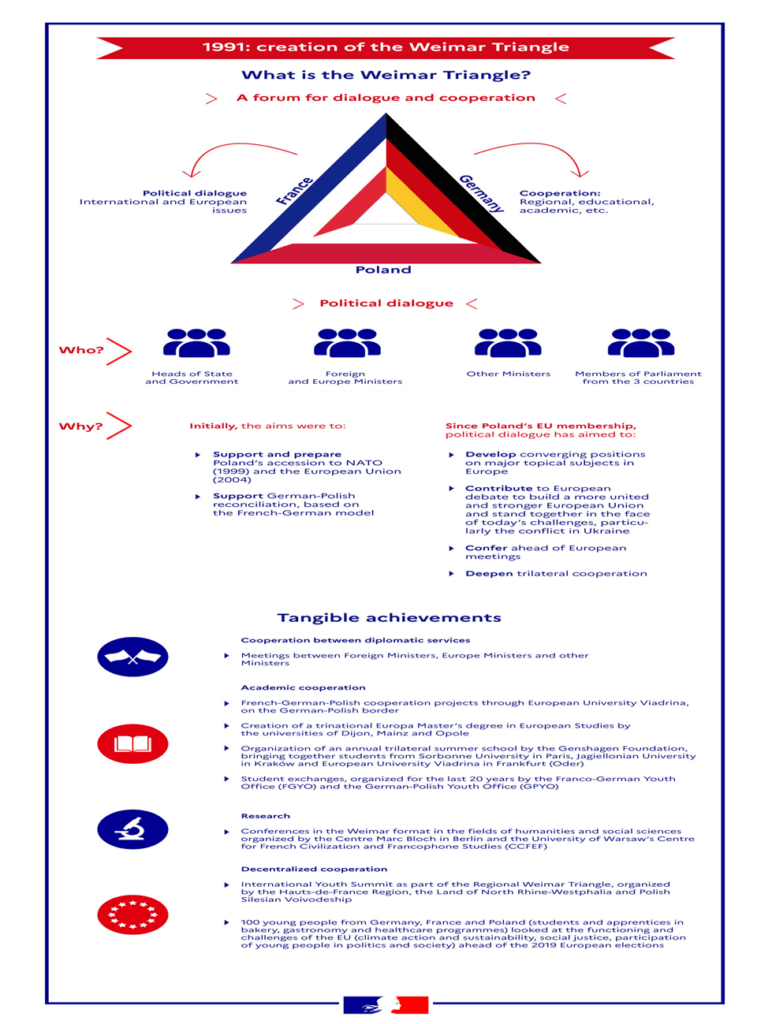Daily Current Affairs : 15-February-2024
Poland, France, and Germany have come together with a shared purpose: to strengthen Europe’s protection and defense capabilities. This collaboration isn’t new; it’s part of a long-standing partnership called the Weimar Triangle. The foreign ministers of these three countries recently met to discuss approaches to enhance their cooperation.
The Weimar Triangle: A Brief History
The Weimar Triangle was established in 1991, aiming to foster cooperation and reinforce ties between Germany, France, and Poland. Here are some key points about its history and purpose:
- Origin: Named after the city of Weimar, Germany, where the first meeting took place.
- Post-World War II Goals: Initially focused on promoting German-Polish reconciliation after the devastation of World War II.
- Focus on Cooperation: The triangle seeks to address diverse issues, including political, economic, and cultural collaboration.
Recent Developments
In light of contemporary global challenges, the foreign ministers have identified the need to revitalize the Weimar Triangle. Their discussions focused on several critical areas:
- Defense Capabilities: The ministers agreed that enhancing defense mechanisms is crucial for Europe’s security.
- Joint Military Exercises: They proposed undertaking more joint military exercises to improve readiness and cooperation among their armed forces.
- Shared Intelligence: Increased sharing of intelligence and information will help the nations respond effectively to threats.
The Importance of Collaboration
Strengthening security in Europe requires collaboration. By working together, Poland, France, and Germany can achieve more than they could individually. The benefits of this partnership include:
- Enhanced Security: A united front can better deter threats.
- Resource Sharing: Pooling resources can lead to more efficient defense strategies.
- Cohesion in Europe: Cooperation promotes stability and solidarity among European countries.

Important Points:
Shared Purpose: Poland, France, and Germany aim to strengthen Europe’s security and defense capabilities.Weimar Triangle: Established in 1991 to foster cooperation and ties among the three nations.Key Historical Points:
- Origin: Named after Weimar, Germany, where the first meeting occurred.
- Post-World War II Goals: Focused on promoting German-Polish reconciliation.
- Focus on Cooperation: Addresses political, economic, and cultural collaboration.
Recent Developments:
- Revitalization: Ministers recognize the need to enhance the Weimar Triangle in response to global challenges.
- Defense Mechanisms: Importance of enhancing defense capabilities for security.
- Joint Military Exercises: Proposal for increased military training to improve cooperation.
- Shared Intelligence: Emphasis on sharing intelligence to respond effectively to threats.
Importance of Collaboration:
- Enhanced Security: A united front can better deter threats.
- Resource Sharing: Pooling resources leads to more efficient defense strategies.
- Cohesion in Europe: Promotes stability and solidarity among European nations.
Why In News
Poland, France, and Germany have pledged to strengthen Europe’s security and defense capabilities, recognizing that a unified approach is essential in addressing current global threats and ensuring regional stability.
MCQs about The Weimar Triangle
-
What is the primary purpose of the Weimar Triangle?
A. To enhance cultural exchanges between the three nations
B. To strengthen cooperation and defense capabilities among Poland, France, and Germany
C. To promote economic trade within Europe
D. To address climate change issues
-
In what year was the Weimar Triangle established?
A. 1989
B. 1991
C. 1995
D. 2000
-
Which of the following is NOT a focus of the recent discussions among the foreign ministers?
A. Joint military exercises
B. Cultural exchange programs
C. Enhanced defense capabilities
D. Shared intelligence
-
Why is collaboration among Poland, France, and Germany considered important for European security?
A. It allows each country to operate independently.
B. It enhances their ability to deter threats and promotes regional stability.
C. It encourages competition among European nations.
D. It focuses solely on economic benefits.
Boost up your confidence by appearing our Weekly Current Affairs Multiple Choice Questions
![]()


